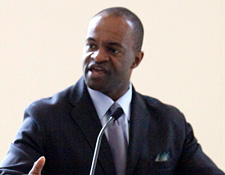NFL Players Association Chief Calls for Better Treatment of Athletes
By Brian McNeill
 |
Athletes should be "good sports" in how they act toward each other, but good sportsmanship should also oblige professional sports organizations to treat their athletes well, National Football League Players Association head DeMaurice Smith ’89 said at the Law School.
"Athlete to athlete, there’s an obligation to be a good sport," he said. "But I also believe there’s an obligation from, indeed, the sport to the athlete."
Smith — who led NFL players in 2011 through a 134-day lockout by the league, culminating in a 10-year collective bargaining agreement — was the keynote speaker at a Law School symposium, "The State of Sports Law," sponsored by the Virginia Sports and Entertainment Law Journal and the Virginia Sports Law Society.
Smith, who was elected the NFL Players Association executive director in 2009, laid out a number of troubling signs that he said indicate a sport is on the wrong track. First among these, he said, is when athletes are treated as athletes first, and human beings second. "If we start off as viewing the participants in that sport as something less than people, then we have failed in our obligation of ensuring that we are engaged in being a good sport," he said.
As an example, Smith noted that last year’s collective bargaining agreement required all NFL medical professionals to conform to professional and ethical standards. "Certainly that was a good day for those players who will all become former players," he said. "But if it is 2011 and that is the first time in history that it has been codified that [NFL] medical doctors have to obligate themselves to the same federal, state, local, professional and ethical standards as every other doctor in the country? I think we can all agree that was about 100 years too late."
Prior to the agreement, he said, it was commonly thought that a "football exception" existed for the players’ medical treatment, meaning that the players would be treated in such a way that would best help the team, rather than what was best for each player. "So when doctors prescribe Vicodin like you would hand out Chiclets to a child, no one thought or wanted to put themselves in a position to say that’s wrong," he said.
Another sign that a sport is on the path to becoming "no longer a good sport" is when athletes are treated as disposable, Smith said. "The one time that [my temper] is guaranteed to get kicked off is when they refer to our men as gladiators," he said. "I will do my best to twist your head off like a top when you refer to our players as gladiators. Because they are not. What is a gladiator? A reference to old Rome where people fought to the death for the amusement of people who weren’t fighting."
Smith pointed to how NFL players have been treated medically by people who are not doctors. Plus, there are few requirements guaranteeing that players undergo important medical testing on an ongoing basis. "While we have moved tremendously since 2009 on the issue [of] concussions, when we are in a world where there are people who are not medically qualified [making] decisions about whether a player can play, I know we have not arrived at that world where we know that we are engaged and perpetuating a good sport."
An organization's level of sportsmanship can be judged in part by how it treats its athletes after they are no longer playing, he said. "If we believe or if we accept any sport, any university, any college, or any governing body like the NCAA, that believes it no longer has an obligation to that person after they are done competing in that sport, I know that we have not arrived or have accepted an obligation of being a good sport," he said.
Until last year’s collective bargaining agreement, NFL players were not eligible for post-career health care until after they had played for three years, he said. Heading into negotiations last year, the league wanted to add two regular season games to the current 16-game format. Most discussion about the idea focused on what the fans thought, he said, and ignored the physical toll that the current schedule is already taking on the players’ bodies.
"At every turn, the only discussion amongst the media, the only discussion amongst the owners, even the only discussion amongst the fans was, what? Well, you know, fans don’t like two preseason games," he said. "To me, the problem of an 18-game schedule, and worse yet, the paradigm of that discussion was that no one pulled back to ask the question — except us — what’s happening to our men under a 16-game schedule as it is?"
Smith said his talk was not motivated by the NFL’s ongoing "bounty" scandal, in which players were allegedly rewarded for injuring other players. Rather, he said, his talk was intended to raise questions about how professional athletes and sports in general are perceived.
"I don’t pretend to have any of the answers, but I do believe that our job, or our role, obligates us to push people to ask the right questions," he said.
Also at the symposium, a panel discussed the realignment of NCAA conferences. The panel featured Christian Dennie, an attorney with Barlow Garsek & Simon; Mark Levinstein, a partner in Williams & Connolly; Michael McCann '02, professor of law and director of the Sports Law Institute, Vermont Law School; Bernadette McGlade, commissioner, Atlantic 10 Conference; and was moderated by J. Gordon Hylton '77, a professor Marquette University Law School.




